👉 back to the dungeons
4/5/2020: The Restaurant was my backdrop/umbrella project from late 2009 thru early 2012 in Providence. It was a strictly "don't post about it online" project, but with 10 years passed, I feel like it's now okay to have it represented here in the archives. Included here are some of my old pictures of menus and the room. I also found two quasi-interviews I did by email about this project, from April and May 2012. I combined & edited my answers from those into the text below. Sharing all this with gratitude to Walker, Kathryn, everyone who came to the Restaurant, & everyone who lived at our house on Lockwood Street during this project & tolerated it.
If you have photos of or memories about the Restaurant, please feel free to get in touch.
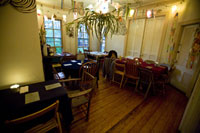
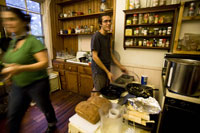
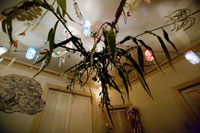
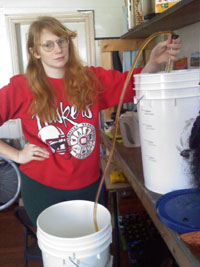
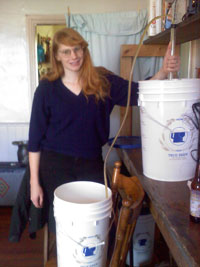
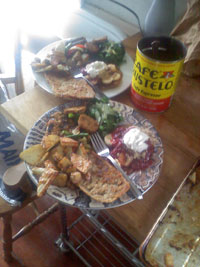
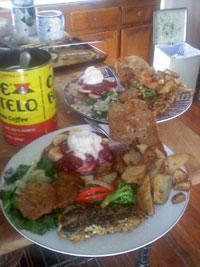
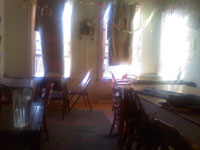
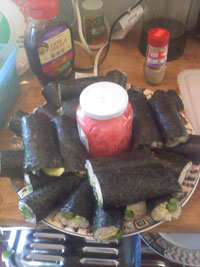
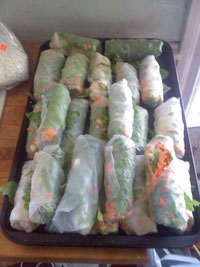
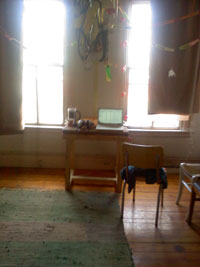
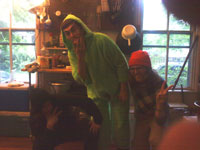
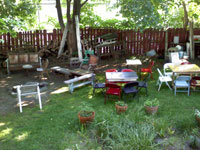
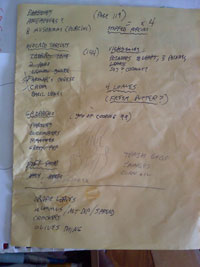
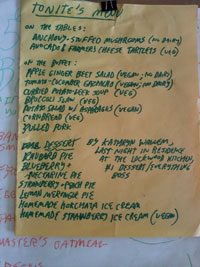
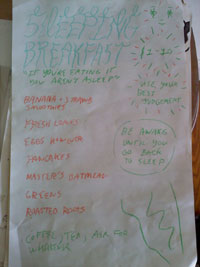
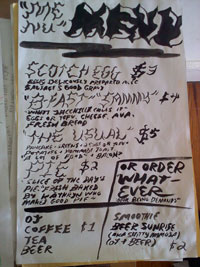
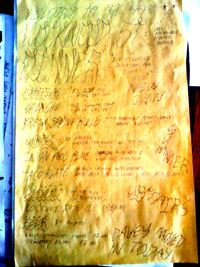
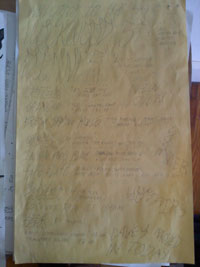
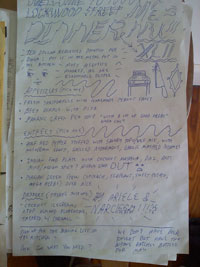
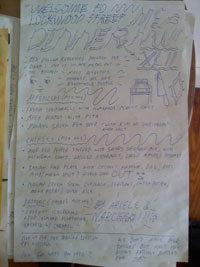
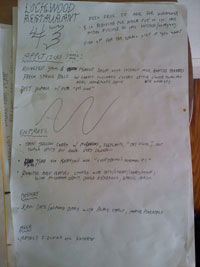
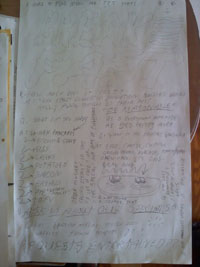
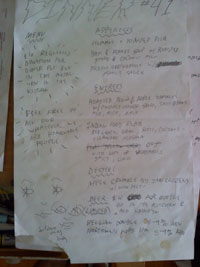
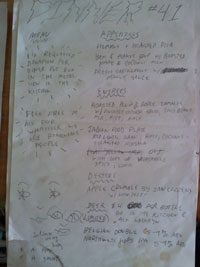
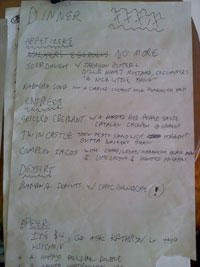
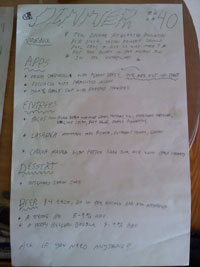
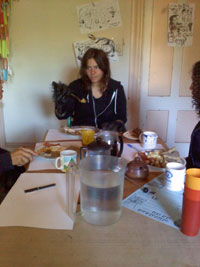
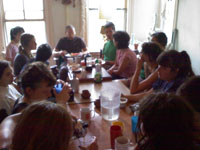
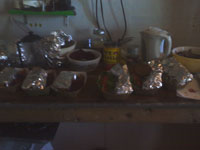
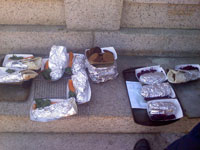
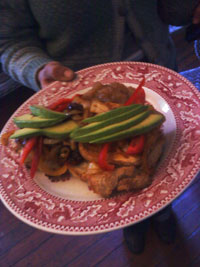
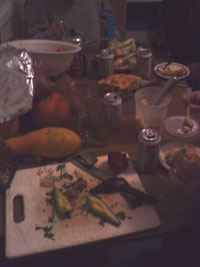
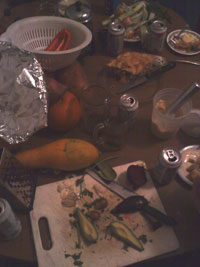
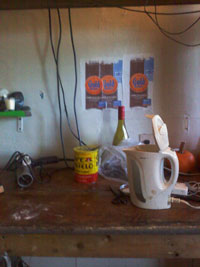
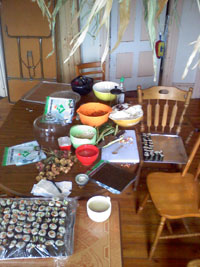
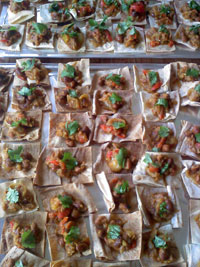
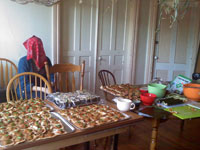
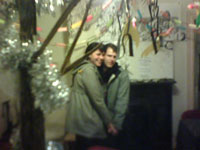
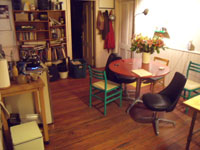
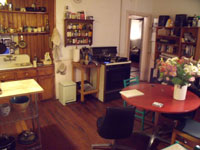
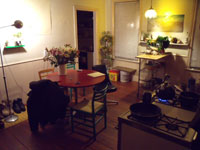
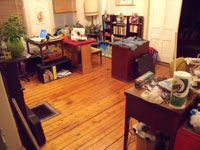
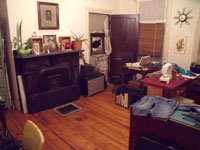
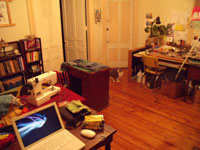
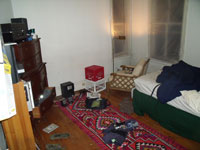
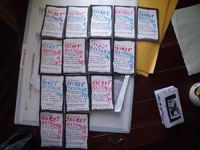
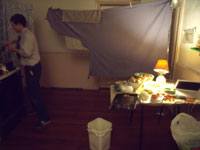
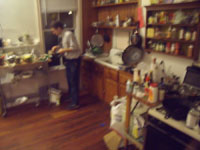
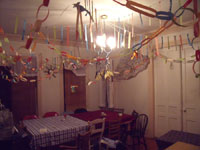
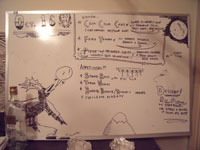
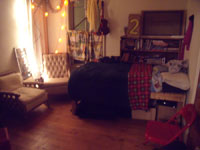
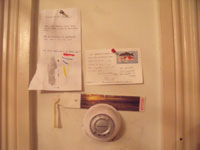
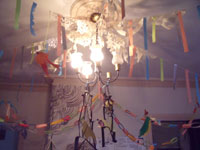
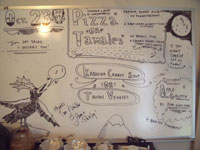
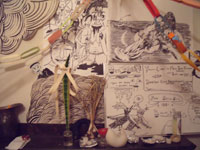
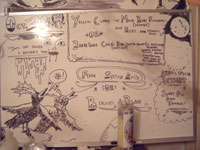
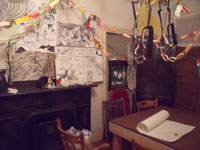
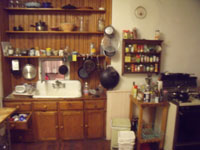
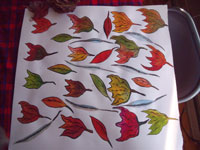
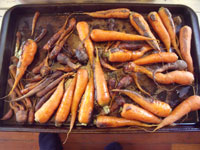
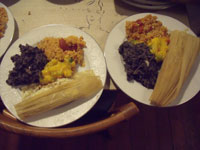
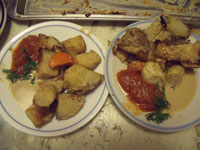
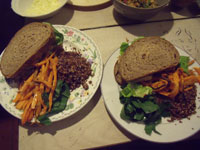
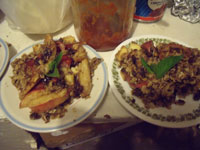
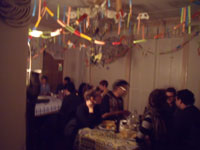
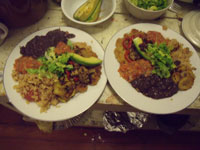
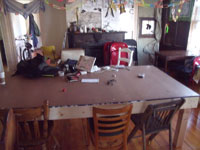
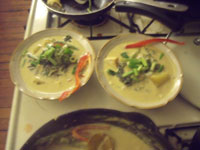
Walker Mettling & I started the restaurant together in October 2009.
We did weekly Friday night dinners by reservation, mainly in the living room and two bedrooms of the first floor apartment of our house. We served on average 50 but as many as 70 or 80 people, and at least twice we did Friday and Saturday dinners back to back. Typically "the Restaurant" refers to these dinners in the first floor apartment, but the umbrella project also included a few dinner services outside in the yard, a few in the house's third floor apartment, and one or two on the outdoor porch of the second-floor apartment (where our landlord usually lived). We also did a few stints of weekday morning breakfasts from 8am-11am, which typically served a a smaller, core group of regulars - rarely over 10 people, but once or twice as many as 25. We also made a few pretty quixotic attempts at doing lunch delivery downtown.
The dinners were vegan and often gluten or soy free. We cooked this way because it kept the common denominator low; the idea was that anyone could eat what we were making. The format was "appetizer + entree + dessert" for a $10 requested donation, which was to be placed in an urn, on an unpoliced honor system. When there was beer brewed, we also sold beer. The breakfasts were priced a la carte off a limited diner-breakfast type menu. During her tenure Kathryn often baked pies for these, and I got into baking bread for them.
Walker and I developed the format and collaborated on many aspects of the programming during "season one," when he was also the chef; October 2009 through June 2010. Kathryn Wallem moved up from New York to be the chef in "season two," August 2010 through June 2011, and "season three," which is September 2011 until now.
Numerous volunteer dishwashers and dessert-makers cycled through, too, usually one of each per dinner, but sometimes with nobody (i.e., just me and KW, or just me and Walker), and other times with as many as four other people helping.
Initially it was a short term money-making idea. I quit my job to go on a tour, which fell through, & I suggested Walker move in and do the Restaurant with me instead. It quickly felt clear to me after moving up here that Providence is only as good for artists as the artists here at the time are making it for each other. Continuing to do it felt like a meaningful way to contribute to that ecosystem, which was what I moved here to participate in. We didn't have any expectations or plan when we started, but I think with this in mind, there was a clear "proof of concept" feeling by the end of the third dinner that favored continuing.
At first, then later not. Providence has a fairly respectful "live and let live" quality to it re: this kind of thing; I never expected my neighbors to complain. Less than cops, I thought "a mobster"(??) could come demand "a piece of the action," but eventually realized that this made cartoonishly zero sense. To say the money was marginal understates it. The restaurant paid my rent, and Walker's (and then Kathryn's) rent, and obviously it bought our groceries (and paid for itself). But two persons' rent in our house was all of $580. Maybe we had an extra like, hundred and fifty bucks each at the end of a good month? My annual budget here in Providence is $6000. We don't use the heat because we can't afford it. At some point I realized the stakes were too low for anyone but us to care. If that sounds negative it's not, actually it was freeing and good.
"Artist" seems sufficient. I did a ton of cooking, and a lot of logistics, but the focus of my "role" was always on making the overall project continue to happen, not on the food specifically.
New Asian Market on Broad Street, Scratch Farm, Red Planet Farm a few times, Price Rite, Virginia & Spanish Peanut Co., Papers & Provisions restaurant supply store on Westminster, Oasis Market on Broad Street, Basement Brewhaus, Blackstone Valley Brewing Supply. I also like the fish counter and getting small free coffee samples at Eastside Marketplace. Walker made the tempeh, Kathryn baked the pies, I brewed the beer.
Friends and friends of friends.
For the first couple we made flyers and gave them out at shows and whatnot. Walker & I pooled our email lists and I sent an email to that list, had a signup sheet out at dinners, and sent further emails to the list every week. The list grew relatively large, and the emails seemed to get forwarded pretty widely.
Ultimately I think the better statistic is that we served over 3000 total meals.
Hard to say, but I would guess that 70-80% of the people who visited the Restaurant visited more than once.
In a way we aren't "closed" any more or less than we were ever "open."
There was no hard part of the business because it wasn't a business, it was a project (which I guess was the hard part). No one else was helping, so I had to do a lot of time-consuming tasks by myself over and over to keep it going. Probably groceries.
On one hand I love grocery shopping and feel that it can be incredibly therapeutic and relaxing to go to the store, zone out, and wander the aisles while "I can't go for that" or whatever plays. But on the other hand, grocery stores can be a bad place to wind up thinking about capitalism, or social justice, or worrying about money. I'd find myself getting sucked into hell zones thinking about other peoples' food, job, and family realities, or about how the Restaurant was itself such a psychotic and inefficient way to be making rent as an artist in a culture that does not value artists inherantly, and that there were literally no other decent job options available that I could find. Thinking about this stuff while trying to maintain a focus on the utopian aspects of the Restaurant and the community it served could make me feel bad and/or insane. It can definitely be hard to try to continue doing something for your community when you find yourself dogged by the sense that both you and your community, within the broader society that you're situated, are doomed. But I mean, I always got through it, and I still do my projects.
At the registers at the Eagle Square Price Rite - which I've been hundreds of times - whenever there's an error and the register person needs to delete an item from a receipt or they double-scan something or whatever, they have to yell "OVERRIDE" and get a manager to come and key into their screen and okay the override. I quickly came to feel that OVERRIDE was Dante-esque... a tortured call by the imprisoned, but also an adjuration for me personally to "override," to "use [my] authority to reject or cancel [the overarching hell reality if even in a pathetically small way]." I think this reflects some pretty big/important feelings about the Restaurant that are also hard.
If by "traditional" you mean "legal" or "licensed" or similar, the answer to that is easy. The idea was to pay rent and give our people something. The "model" of it being in our house is a product of the practicality and expedience of trying to do these things given what we have (our time, a house). Also the Restaurant was never the main project for any of us - I considered my main projects to be my writing and later increasingly my painting - and it always operated on a pretty strict basis of "if any of us don't want to do it anymore, we don't have to do it anymore."
That said, the more important binary to think of the Restaurant occurring within isn't "legal/illegal" "traditional/non-traditional" but, as I mentioned earlier, "project/business." Though the Restaurant has always been "profitable," it's not that profitable; all things considered, in terms of an hourly, it breaks down to something below $3.00 per.
The Restaurant was "a project" and not "a business" because a business prioritizes generating profits, but an artist-run project prioritizes abstract results. As far as I understand it, it was successful in generating those, and speaking as an artist (and not as a general manager), that's more important to me at this point than the fact that it also paid my rent.
I mean we didn't have and weren't running from "a model," so I don't know if there are really any general takeaways. But I can speak to my experience, which was:
Pros = It mostly ruled that my job was hanging out in my house with my friends playing records, cooking food, and giving people I care about somewhere to go. I met a lot of people and made a lot of new friends. I find total creative freedom at an abyssmal hourly to be much better than most alternatives. I ate so much good food. We made something exciting enough that one of my friends actually moved here to work on it with me. Many people were positively affected and seem to recall especially the "highly active" period of February 2010-June 2011 with fondness. I got to have a strange, longterm, highly-developed relationship with a space in creative and physical terms. I got better at cooking. Etc.
Cons = Ultimately the Restaurant started to seem like a distraction from my primary projects, but really the issue was that being extremely broke was becoming a problem for me, especially as other things in my life had shifted in a way that added pressure. The Restaurant definitely stressed some relationships, as consuming projects will unfortunately sometimes do. The actual presence of the Restaurant during non-dinner-days in the kitchen and living room was physically and psychically invasive - it's weird to live in a Restaurant, it's weird to ask your roommates to live in your Restaurant. (However this is also a part of the abstract Pro I include above.)
Providence has a long history of gray-area-usage spots so ya, like a hundred, including at least five other restaurant projects that I knew of that happened at the same time as the Restaurant. I was not aware of any that were in as regular or as long-running operation.
A lot of stuff I could think to mention here just isn't mine to talk about. I moved here in February 2009, which by the measures of the context I'm operating in, is "pretty late." It's also wrong to think of "all the underground things that happened here before" as occurring within any single unified "history" - "my community" here is federated, with at least three obviously distinct, "active" groups, each with their own spaces, types of events, internal histories, and so on - it's definitely not "one thing." I can only speak for my narrow experience of my own limited time here, which here I'm gonna largely limit to the Restaurant.
However re: live and let live, I should dial that back; many people here would rightly disagree with that characterization of the city's relationship to its artists. It's super notable that there have been serious evictions of the kinds of spaces I'm talking about even during my time, and if "the record" here shows anything, it's that gray-area spaces can and will be closed or ended at any time by larger, disinterested powers, with little or no notice.
On the other hand, there is a kind of "room to person" dynamic that's good here, even if the "city to room" dynamics are ambivalent, uncaring, or occasionally hostile. It's hard to describe this, except by saying that there seems to be a high level of social permission to make a gigantic insane mess, accompanied by a high level of general trust that you'll see to the mess being cleaned up when you're done. I've observed here that if you're current on rent and not bothering or in some form of competition with some outside force (such as a real estate interest), nobody will really care from day to day about the details of what you're privately doing in your space, even if it's completely insane. From a certain creative perspective, a ton of incredible things can happen from that - such as for instance that you can run a restaurant out of your house. (My landlord has enjoyed attending the Restaurant, which is absolutely wild to me.) Swinging the same pendulum in the other direction, it's hard not to see this permissive "do what thou wilt" environment having a relationship to or somehow being a product of the fact that Rhode Island is famously very corrupt. And again, when push comes to shove with the spaces we're using, it feels hard to say that the city really sees any value in what "my community" is doing, if it sees what we're doing at all. While that ambivalence from the city is often fertile, it's absolutely not to be confused with love or support.
Finally, a boilerplate/obligatory thing to note is that artists have been occupying old mill buildings and doing things in them here for at least the last twenty years. The most famous single example of that is Fort Thunder, eulogized six years after its literal annihilation here in Providence at the RISD Museum; see the show catalogue for more on that. As a counterpoint, per what I'm saying above about who's story it is to tell, here's a useful take from Raphael.
There's absolutely a network connecting people interested in a certain approach to doing projects, but in my case that isn't really at all related specifically to food. For me, the way the Restaurant is not "a restaurant business" is the same as how a music show in a basement is not "a nightclub venue business." They're social projects that organize people in a space around an activity.
I dunno if it's a "movement" so much as a number of discrete instances sharing common characteristics, and again, the food aspect of the Restaurant wasn't where my interest was focused, so I dunno that I have a relevant opinion here. From my view the Restaurant shares an underground with the Providence newspaper Mothers News or the western Massachusetts band Noise Nomads, via the common denominator "aiming for total freedom plus desire and interest as a basis for trying to leave planet earth." If there're "pop-ups" that are also operating on that level I haven't encountered them yet.
I do like that a lot more people seem to be having the necessary freedom feelings required to do their projects in scrappier-seeming ways lately, whether or not those people/projects have anything to do with me or the things I care about. There're more restaurants now, but also more bands and more self-publishing, and all of these things are a lot easier to find than they were 5 years ago. Setting aside my generally deep skepticism around commercial or careerist motivations and contexts for creative projects, I feel that this is mostly good. I also like and find it encouraging that it's not entirely insiders who were already there who are willing to find and engage with these projects, because it means these projects do in fact have some small potential value to the further world. I love when my friends come to the Restaurant obviously, but I really love when someone I don't know takes the leap to show up at my house and eat dinner, because welcome to my world.
From here on out, it's just to do it if/whenever it seems like a good idea to do it. We'll probably do a couple outdoors services and a week of breakfasts once it's reliably warm out. We'll see after that.
This is already so long and there are too many to list BUT, in winter 2010 I lived in the uninsulated front room, and like I said, no heat, so being in my room was almost exactly like being outside. I'd go to sleep with a quart-sized Ball jar of boiling water at the bottom of my sleeping bag under my mound of blankets, and if I left it there all day, it'd be frozen solid by the time I got back the next night. I was lying in there one afternoon trying to motivate to get up and a lady from the local news called asking if she could bring a camera crew in to "film one of our dinners." Of course the answer was no, but I thought it was funny to get this call for a million reasons - e.g. I imagined a camera crew coming over to see me lying in bed looking at my breath in the air of my 20 degree room, talking about the Restaurant that also exists in the house, and their trying to figure out how to explain that in a way that would make any sense at all on the evening news. Still, we had a funny chat on the phone about it for about a half hour, and after that I sent the news lady a postcard for my last few art shows.
Once our friend Mickey came to the restaurant very tequila drunk and somehow lost her shoes. She was wearing a gorilla mask and kept saying "It was a new balance shoe" in a gorilla voice. She scrawled her name ("Mickey") on the stove and on some shelves in sharpie. They were actually reeboks when we found them I think? Kind of a stupid story I know but it was very funny to us at the time and "it was a new balance shoe" achieved a kind of classic catchphrase status.
Infinite garlic simmering in infinite butter.
👉 back to the dungeons